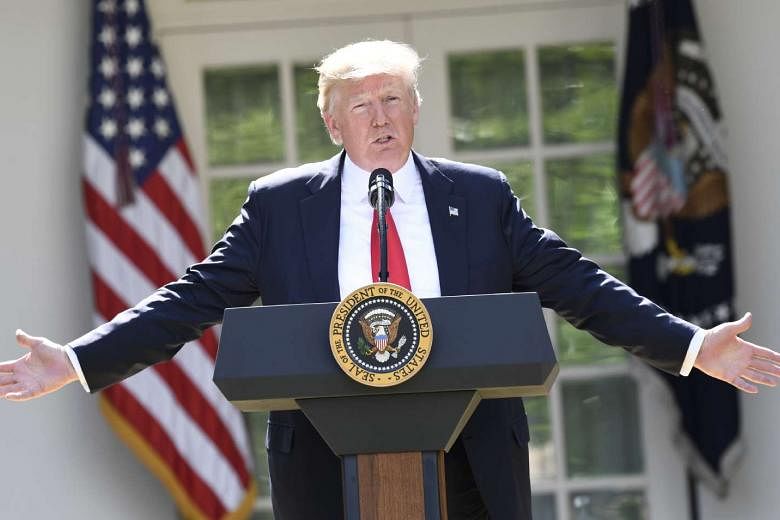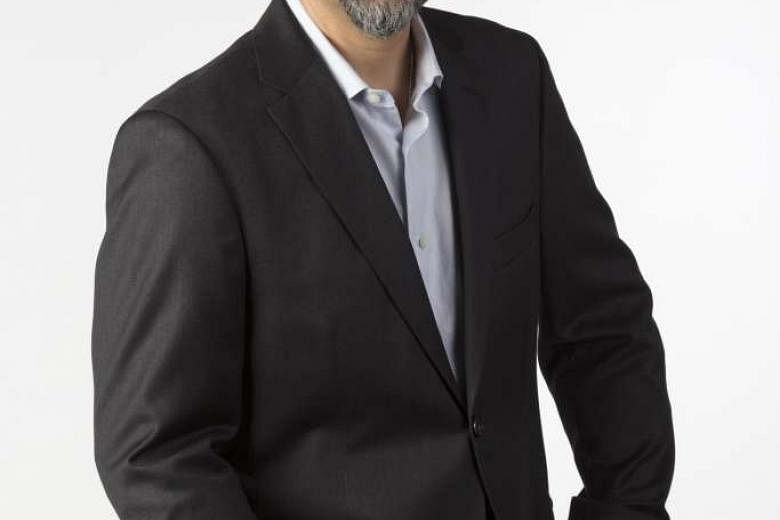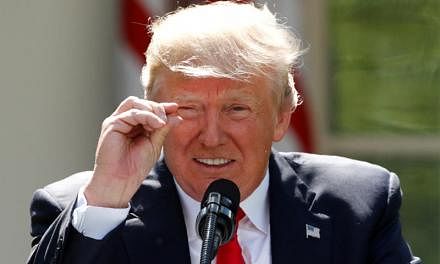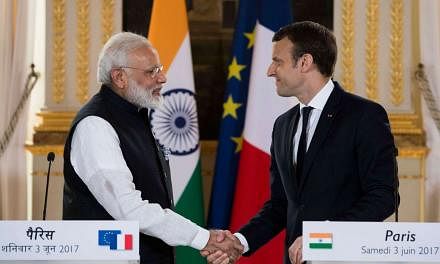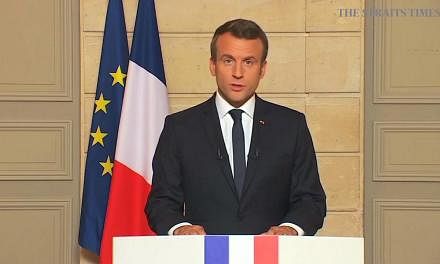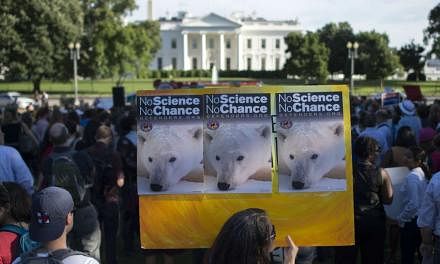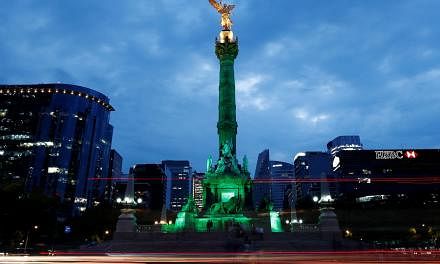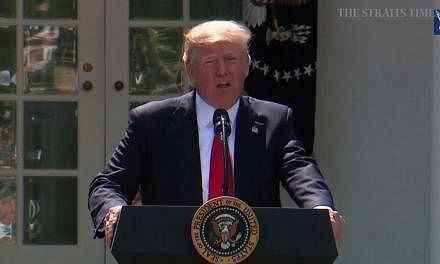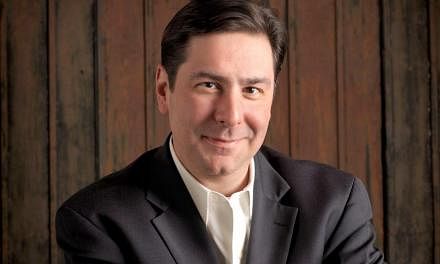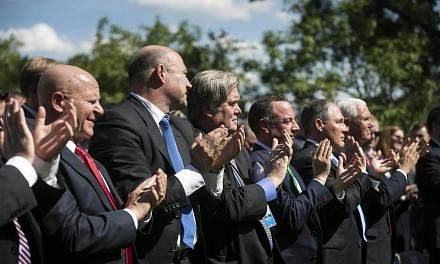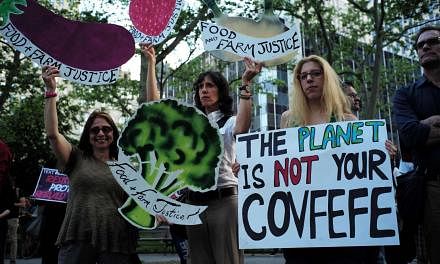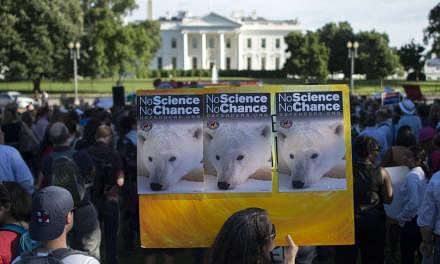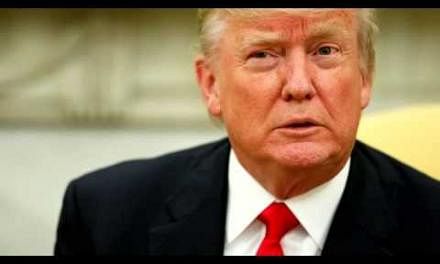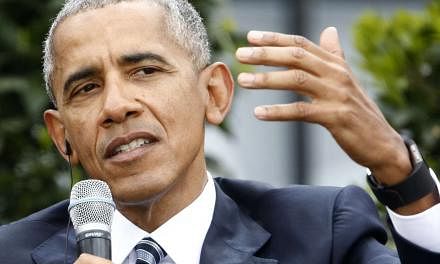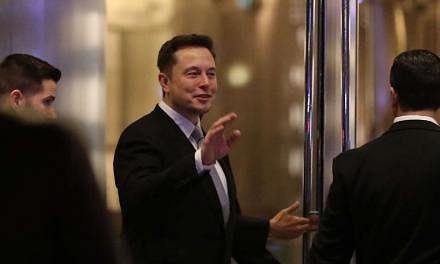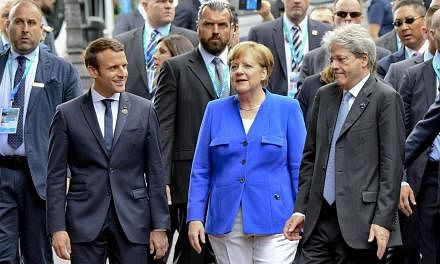WASHINGTON - The US withdrawal on Thursday (June 1) from the Paris Agreement is the second abrogation of an international accord by President Donald Trump, after his pullout from the Trans Pacific Partnership (TPP).
At home, it plays directly to President Donald Trump's power base - coal and steel country where the popular narrative is that jobs have been lost to environmental regulations and a shift towards clean energy.
Mr Trump in his campaign had pledged to abrogate the Paris Agreement, and he began his announcement saying "One by one we are keeping the promises we made to the American people."
"I was elected to represent the citizens of Pittbsurgh not Paris," Mr Trump said, on live television from the Rose Garden at the White House.
Withdrawing from the Paris Agreement was a "reassertion of America's sovereignty" he insisted, excoriating the accord for allowing China and India to continue raising their emissions while at the same time being paid by the US through the Green Fund which compensates developing countries.
America has already reduced its carbon emissions, the President said. But "compliance with the agreement's energy restrictions could cost as much as 2.7 million lost jobs by 2025. This includes 440,000 manufacturing jobs. This is not what we need."
The withdrawal has been championed by the President's chief strategist Stephen Bannon, and others like arch conservative climate change sceptic Myron Ebell of the libertarian Competitive Enterprise Institute (CEI), and head of the Environmental Protection Agency (EPA) Scott Pruitt
The withdrawal is also a triumph for deeply conservative elements that have long fought tooth and nail against the developing consensus on anthropogenic climate change - in plain language global warming driven by greenhouse gases emitted by human activity, principally the burning of fossil fuels such as oil and coal.
The decision to abandon the agreement puts the US at odds with 197 countries - 147 of who have ratified the Convention. But the President left the door open to "re-entering" or "renegotiating" the agreement, or negotiating a fresh agreement, on fairer terms for the US.
In an e-mail to The Straits Times, a spokesman for the US Chamber of Commerce in Washington wrote: "The business community stands ready to fashion solutions to keep America prosperous, clean, and secure. America should choose a path for an energy future that is achievable, affordable, and most importantly meaningful.
"We look forward to working with the President, the Congress, and all stakeholders to provide the innovation and technology that will allow America and the world to meet its environmental goals and energy needs."
Certainly its critics say the Paris Agreement is weak. Commitments are voluntary and there are no penalties for non-compliance.
The wider message of Mr Trump's decision is his "America First" agenda against the US global role.
The move deals a "decisive blow to US credibility abroad" and puts the world "closer to a collision course with its addiction to fossil fuels," the consultancy Soufan Group said in an e-mail.
In an e-mail to The Straits Times hours before President Trump's decision, Dr Brahma Chellaney, professor of strategic studies at the Centre for Policy Research in New Delhi, wrote: "A US exit... will strengthen the international impression that the US negotiates, signs but then repudiates international agreements."
The promise of more jobs for coal and steel country is a mirage, however, said Elliot Diringer, executive vice-president of the non-partisan Centre for Climate and Energy Solutions.
"This decision may well cost US jobs" he told The Straits Times over the phone. "Coal jobs have been declining because of automation, well before environmental regulations, it's an old story. That's not going to be reversed."
Instead, job creation in the field of clean and renewable energy has been picking up. Nationally, clean energy industry jobs outnumber and are growing faster than fossil fuel jobs.
The Paris Agreement that entered into force in November 2016, committed the US to reduce its greenhouse gas emissions by 26-28 per cent below the 2005 level in 2025, and make "best efforts" to reduce emissions by 28 per cent.
That meant retooling the US economy towards greater energy efficiency, and curbs on carbon dioxide, methane, nitrous oxide, perfluorocarbons, sulfur hexafluoride and nitrogen trifluoride, which contribute to global warming.
But conservative and libertarian think-tanks such as the Heritage Foundation and the CEI were staunchly opposed. The Heritage Foundation in April 2016 maintained that, "policies that restrict the use of carbon-based energy in America will kill jobs and stifle economic growth."
Restricting the use of carbon-dioxide-emitting fuels such as coal, oil, and natural gas would "significantly harm the US economy" the Heritage Foundation said.
A slew of American corporations had frantically lobbied the president to stay in the agreement, taking full page ads in newspapers up to Thursday morning.
"Companies will pass higher costs on to consumers or absorb the costs, which prevents hiring and new investment. The result is fewer opportunities for American workers, lower incomes, less economic growth, and higher unemployment."
The CEI - which has been funded by among others, the conservative billionaires Charles G. and David H. Koch - in 2006 released a video set to dreamy music, showing happy families, which flipped the conventional view that oxygen is the basis of life.
Instead, it argued, carbon dioxide (CO2) was the basis of life. Showing a picture of oil fields, the narration said: "The fields that produce CO2 have freed us from a world of backbreaking labour, lighting up our lives."
"Carbon dioxide they call it pollution, we call it life," the video concluded.
Those who are for the Paris Agreement have also taken out advertisements to state their position and influence the public. Companies including Adobe, Apple, Facebook, Hewlett Packard, Intel, Morgan Stanley, National Grid, PG & E and Schneider Electric said in the advertisements: " By expanding markets for innovative clean technologies, the agreement generates jobs and economic growth"
"US companies are well positioned to lead in these markets. Withdrawing from the agreement will limit our access to them and could expose us to retaliatory measures."
Even Darren Woods, chief executive officer of oil giant Exxon Mobil, reportedly wrote a personal letter to Mr Trump last month, saying the US was "well positioned to compete" and staying in the Paris Agreement means "a seat at the negotiating table to ensure a level playing field."
Ahead of the President's announcement, New York City Mayor Bill de Blasio called the decision "unconscionable" and declared that he would sign an "executive order maintaining New York City's commitment to the Paris Agreement."
And in a Tweet minutes after the President had finished speaking, SpaceX and Tesla CEO Elon Musk said: "Am departing presidential councils. Climate change is real. Leaving Paris is not good for America or the world."

